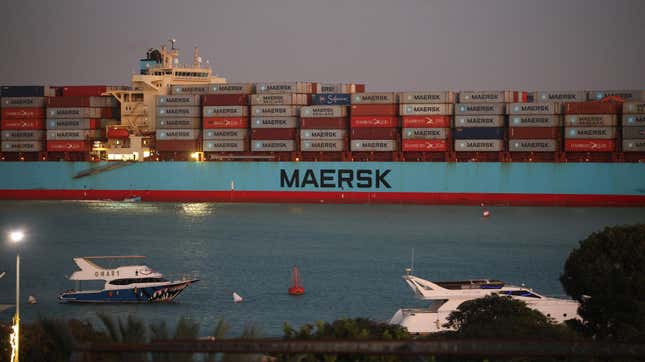
A Maersk ship hanging out in the Suez Canal when that was still a thing.Image: Stringer/Bloomberg via Getty Images (Getty Images)
Israel is still bombing the Gaza Strip, having killed at least 27,000 people since the Oct. 7 Hamas attack killed about 1,200. The Houthi rebels in Yemen have been shooting missiles at Israel-bound and US-flagged ships in the Red Sea in protest (because Israel is the largest foreign recipient of US military supplies). And to steer clear of having their crews and ships targeted, global shipping companies started routing them the long way to other side of the Suez Canal, around South Africa’s Cape of Good Hope.
How to negotiate salary going into a new job | Your Wallet
The situation was supposed to make shipper Maersk a lot of money. Analysts had been slowly raising their expectations for the numbers it would report on Thursday.
“The impact to our customers has been significant already,” CEO Vincent Clerc told investors on a call to go over the earnings. “They are facing longer trips, additional charges, and lower schedule reliability caused by having to reroute ships southwards. We are working diligently at mitigating as much of this impact as possible, but these efforts come at a premium.”
But it wasn’t enough of a premium. Maersk reported a $436 million loss on $11.7 billion in revenue for the fourth quarter of 2023. That would have been great back in October, when analysts had lower expectations, but not now. Angry investors are dumping the stock, which is down 15%.
Boat bonanza backlash
Unfortunately for Maersk and other shipping companies, the last windfall — from the pandemic’s supply chain kinks — gave them a lot of money to spend on new ships. And spend they did: John McCown, the founder of Blue Alpha Capital and a shipping industry veteran, told Bloomberg last summer that he was “looking at the biggest order book in container shipping history.” All those extra ships are driving down rates, and they’ll continue to do so even if Houthis stop target vessels in the Red Sea.
“We go into 2024 with a significant supply-side challenge in shipping,” Clerc said on the Maersk call. “We spoke about it in November 2023, and that remains unchanged. The Red Sea disruption is absorbing some of the overcapacity temporarily. However, the structural imbalance will catch up during 2024 and exacerbate over time, irrespective of whether the situation in the Red Sea endures or resolves itself.”
>>> Read full article>>>
Copyright for syndicated content belongs to the linked Source : Quartz – https://qz.com/maersk-red-sea-crisis-stock-fall-1851238652
